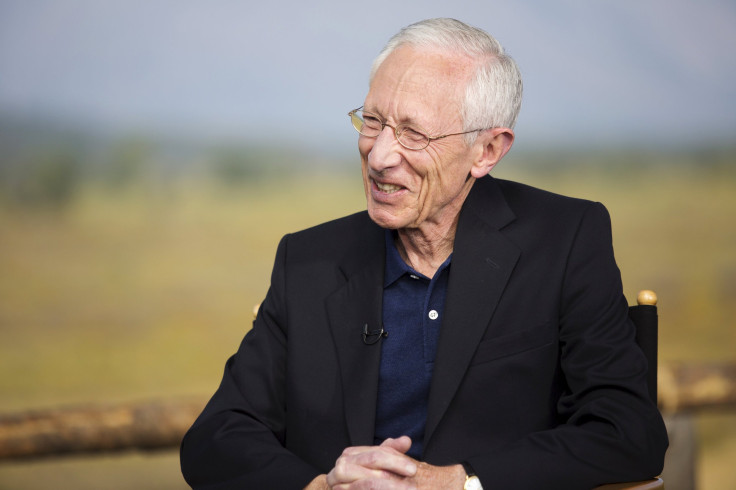Stanley Fischer Speech: 3 Takeaways From Federal Reserve Vice Chairman’s Comments At Jackson Hole Symposium

Economy watchers got some key clues Saturday as to the timing of the U.S. central bank's next interest rate hike. U.S. Federal Reserve Vice Chairman Stanley Fischer spoke about the state of the U.S. economy at the annual Economic Policy Symposium in Jackson Hole, Wyoming, which brings together many of the world's central bankers.
As part of the talk, Fischer dropped a few hints about interest rates, which have hovered near historic lows since the global financial crisis. The annual event comes at a pivotal time when global markets reacted violently this week to signs China's economy is decelerating at a much faster pace than expected. Experts fear an economic slowdown in the world’s second-largest economy could stall the U.S. recovery following the Great Recession.
Here are the three main takeaways from Fischer’s speech:
1. Central bankers are following developments in China’s economy. Even before China’s stock market began to plunge this week, the U.S. Federal Reserve was questioning its stance on an interest-rate increase planned for some time later this year. Many experts had forecast September as the most likely time frame for the central bank to lift rates for the first time in nearly a decade.
At this moment, we are following developments in the Chinese economy and their actual and potential effects on other economies even more closely than usual,” Fischer said in prepared remarks to central bankers at the annual conference in Jackson Hole, Wyoming.
China surprised global markets after devaluing the yuan two weeks ago, and then at the end of last week, data showed production in Chinese factories shrank in August at its fastest rate in more than six years, sparking fears its economy is decelerating at a much faster pace than expected pace.
The central bank needs to consider the overall state of the U.S. economy, Fischer said, as well as “the influence of foreign economies on the U.S. economy” as the Fed reaches its judgment on whether and how to change monetary policy.
The Fed is interested more in where the U.S. economy is heading than in knowing from where it has come, Fischer said, adding the central bank follows economic developments in the rest of the world as well as the U.S. in reaching our interest rate decisions.
2. The path of interest rates matters more than the particular timing of the first increase. As global markets witnessed multiple bouts of volatility this week, economists question whether the U.S. is strong enough to move away from crisis-level interest rates.
The Fed has a “dual mandate” of stabilizing U.S. inflation and achieving maximum employment. To meet the central bank’s goals of maximum employment and price stability, Fischer said the Fed will most likely need to “proceed cautiously” in normalizing its monetary policy stance.
For the purpose of meeting our goals, the entire path of interest rates matters more than the particular timing of the first increase,” Fischer said.
There is just one more monthly unemployment reading ahead of the Federal Reserve’s next meeting on Sept. 16-17. The financial markets reacted with mixed emotions to the July numbers because the report didn’t completely solidify whether the Fed would actually hike rates in September, or hold off until later.
The August employment report is due out Friday.
3. The Fed shouldn’t “wait until inflation is back to 2 percent to begin tightening.” Fischer still left the door open for a Fed rate increase in September.
Fischer cautioned delaying action to tighten monetary policy until U.S. employment and inflation reach the central bank’s targets would risk overheating the economy. However, data released Friday showed the Fed’s preferred inflation gauge, the price index for personal consumption expenditures, remained below the Fed’s 2 percent inflation target for 39 consecutive months.
Even so, Fischer said the effects of a strengthening U.S. dollar on inflation are beginning to fade, along with the sharp fall in oil prices, which have lost 60 percent of their value in the last year.
Given the apparent stability of inflation expectations, there is good reason to believe that inflation will move higher as the forces holding down inflation dissipate further," Fischer said.
The speech comes after Federal Reserve Bank of Atlanta President Dennis Lockhart said Monday he continues to expect a rate hike this year, but cautioned a stronger dollar, a weaker Chinese yuan and falling oil prices could complicate the central bank’s outlook going forward. Meanwhile, top U.S. central bank official William Dudley, president of the New York Federal Reserve, said Wednesday a September interest rate hike appears “less compelling.”
Jessica Menton is a writer who covers business and the financial markets. News tips? Email me here. Follow me on Twitter @JessicaMenton.
© Copyright IBTimes 2024. All rights reserved.





















